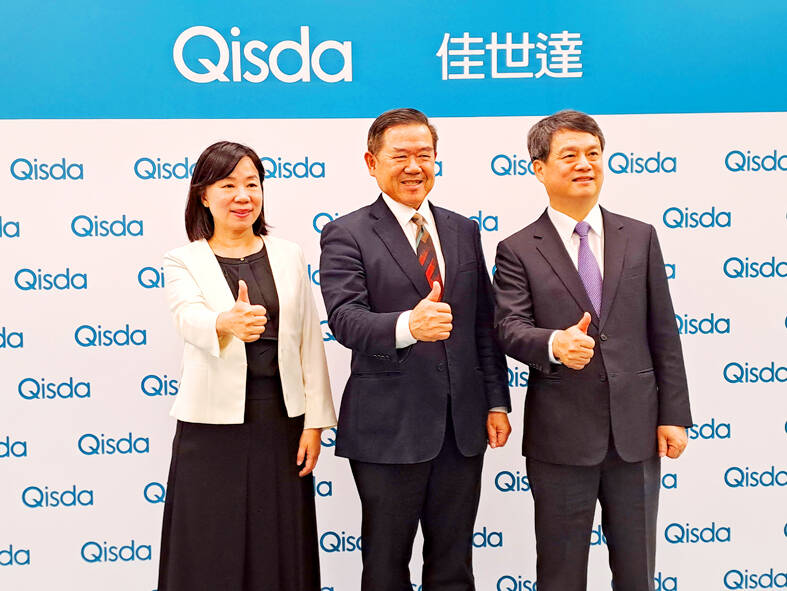LCD and projector maker Qisda Co (佳世達) on Thursday reported that its second-quarter revenue increased 7.2 percent year-on-year to NT$53.46 billion (US$1.85 billion), boosted mainly by rising sales in its business solutions and medical applications sectors.
The company’s sales in the information and communications technology (ICT) sector, as well as the networking and communications sector, also increased from a year earlier, a Qisda official who declined to be named said yesterday.
Revenue last quarter rose 7.5 percent from the first quarter, meeting the company’s guidance, thanks to inventory building by customers during the 90-day pause from the US’ “reciprocal” tariffs.

Photo: CNA
Sales growth at the company’s business solutions division was driven mainly by its smart solutions subsidiary Metaage Corp (邁達特), while the medical applications division benefited from increased sales at its drugstore chain TinTin (丁丁藥局), the official said, adding that the networking and communications division was boosted by rising sales in data center switches by its subsidiary Alpha Networks Inc (明泰).
Cumulative revenue in the first half of the year was NT$103.21 billion, up 6.65 percent from NT$96.77 billion in the same period last year, Qisda said.
By sector, the ICT business accounted for 55 percent of total revenue, followed by business solutions at 16 percent, medical applications at 14 percent, networking and communications at 9 percent, and the rest at 6 percent, the company said.
The revenue outlook for the ICT sector, the company’s main sales driver, comprising LCD monitors, projectors and other information technology products, would largely depend on customer demand, foreign exchange rate fluctuations and the US’ tariffs policy, the official said.
Qisda’s major production bases are in Taiwan, China and Vietnam, with some assembly lines in California and Mexico.
The medical applications business delivers the highest gross margin among the company’s product lines, the company said, adding that it mainly sells to Asian customers and that US tariffs would have limited impact.
Qisda would adjust capacity allocation if needed, as it is considering expanding capacity at its Ha Nam plant in Vietnam after Washington and Hanoi reached a trade deal this week to cut tariffs on Vietnamese goods to 20 percent from 46 percent, while China could still face higher US tariffs, the official said.
LCD monitor production in Vietnam in the second quarter increased by a double-digit percentage from a year earlier, the official said.
The company in March said that it aimed to triple production by the end of the year.

MARKET LEADERSHIP: Investors are flocking to Nvidia, drawn by the company’s long-term fundamntals, dominant position in the AI sector, and pricing and margin power Two years after Nvidia Corp made history by becoming the first chipmaker to achieve a US$1 trillion market capitalization, an even more remarkable milestone is within its grasp: becoming the first company to reach US$4 trillion. After the emergence of China’s DeepSeek (深度求索) sent the stock plunging earlier this year and stoked concerns that outlays on artificial intelligence (AI) infrastructure were set to slow, Nvidia shares have rallied back to a record. The company’s biggest customers remain full steam ahead on spending, much of which is flowing to its computing systems. Microsoft Corp, Meta Platforms Inc, Amazon.com Inc and Alphabet Inc are

Luxury fashion powerhouse Prada SpA has acknowledged the ancient Indian roots of its new sandal design after the debut of the open-toe footwear sparked a furor among Indian artisans and politicians thousands of miles from the catwalk in Italy. Images from Prada’s fashion show in Milan last weekend showed models wearing leather sandals with a braided design that resembled handmade Kolhapuri slippers with designs dating back to the 12th century. A wave of criticism in the media and from lawmakers followed over the Italian brand’s lack of public acknowledgement of the Indian sandal design, which is named after a city in the

INVESTOR RESILIENCE? An analyst said that despite near-term pressures, foreign investors tend to view NT dollar strength as a positive signal for valuation multiples Morgan Stanley has flagged a potential 10 percent revenue decline for Taiwan’s tech hardware sector this year, as a sharp appreciation of the New Taiwan dollar begins to dent the earnings power of major exporters. In what appears to be the first such warning from a major foreign brokerage, the US investment bank said the currency’s strength — fueled by foreign capital inflows and expectations of US interest rate cuts — is compressing profit margins for manufacturers with heavy exposure to US dollar-denominated revenues. The local currency has surged about 10 percent against the greenback over the past quarter and yesterday breached

The US overtaking China as Taiwan’s top export destination could boost industrial development and wage growth, given the US is a high-income economy, an economist said yesterday. However, Taiwan still needs to diversify its export markets due to the unpredictability of US President Donald Trump’s administration, said Chiou Jiunn-rong (邱俊榮), an economics professor at National Central University. Taiwan’s exports soared to a record US$51.74 billion last month, driven by strong demand for artificial intelligence (AI) products and continued orders, with information and communication technology (ICT) and audio/video products leading all sectors. The US reclaimed its position as Taiwan’s top export market, accounting for